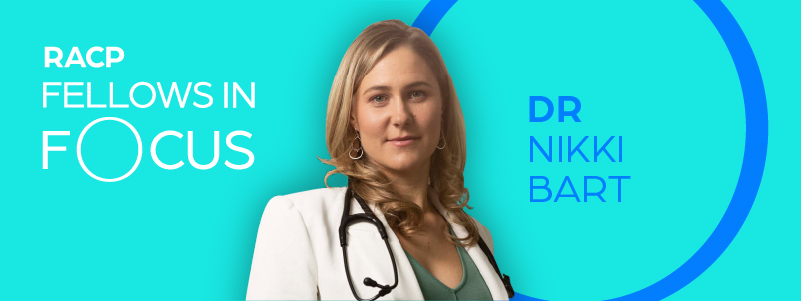RACP Fellows in Focus: Dr Nikki Bart
Date published:
21 Jun 2021

Dr Nikki Bart is a heart failure and transplant cardiologist at St Vincent's Hospital in Sydney, Australia. She has a long list of accomplishments including a PhD at Oxford University as a Sir John Monash Scholar and has also been awarded a Fulbright scholarship to further her research at Harvard Medical School. It has also been well documented that not only is she a celebrated cardiologist, she is also a world record-breaking mountaineer who, with her mother, were the first mother and daughter team to climb Mount Everest. In completing this challenge, they also became the first mother and daughter team to smash the Seven Summits, that is, the highest peak on each continent.
We were interested to understand more about an incredibly inspirational human and what provides her with real pleasure within her role at St Vincent’s Hospital. She shared, “One of the joys of cardiology for me is that it is acute medicine. You see patients when they're critically unwell, and at their most vulnerable, and you get to make a meaningful difference to their care. You also get to follow patients up long term, after their heart attack or first admission with heart failure. I see them in my clinic down the line when they are well and get to talk to them about their families and their passions, and I love this aspect of the job.”
“I love that it's very cutting-edge. You've got to stay completely up-to-date with everything, because there's always a new valve or type of device or new treatment. That very much keeps me on my toes. I liked the challenge of that. I like that it's very diverse, and you get a little bit of everything.”
Nikki’s passion for what she does is deeply compelling, she feels her most valuable skill that allows her to be the best is “my ability to look at the presenting problem, obviously that's the acute thing that needs to be fixed, but I also like to think about the patient as a whole. For example, their comorbidities, their social history, what really matters to them, and treat them as a whole person”.
For someone that has climbed to the highest altitude possible on our planet, you would have thought that Nikki would simply laugh in the face of adversity, but humble as ever, she noted that, “We [St Vincent’s] retrieve the sickest patients in the country. None of them are straightforward. It’s like a puzzle. You've got this very sick patient, but you've got to think about why they are like this and what you can do. There are lots of treatment options and sometimes they conflict. It's not like they come in with A, so you do B and the answer is C. There's a multitude of things going on and often with these complex patients, it's the challenge of problem solving that I love."
“I am very privileged to work as part of a large and amazing multidisciplinary team including surgeons, other cardiologists, transplant coordinators, junior doctors, social workers and physiotherapists, and everyone has a vital role to play. When a patient is challenging, you do need the whole team to work collaboratively, to see them improve."
Working as part of a unit to solve mind-boggling problem and pushing her body to the limit in her personal life would surely leave little room for much else, but this wasn’t the case for the intrepid adventurer, “I do a lot of teaching. I'm incredibly passionate about medical education. I teach the Basic Trainees and I've also had the unique role of being able to mentor a few trainees. Being able to mentor someone to get them through that difficult period, and then seeing them out the other side, I really love.”
And for those thinking of attempting to follow her footsteps, she offered, “I'm a passionate believer of having a life outside of medicine. I think that it makes you a better doctor. Sometimes, unfortunately, the demands of the system can become very overwhelming. Protecting what precious time you have is so important. I'm a real advocate for that. Whether it be reading or cooking or walking or whatever it is, being able to have that space outside of medicine will make you a better doctor.”